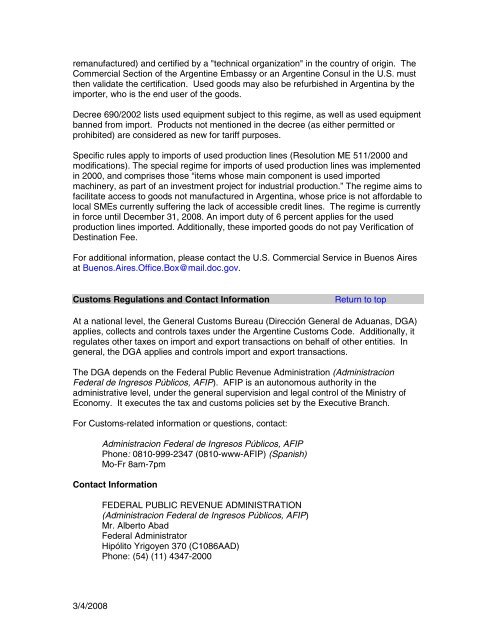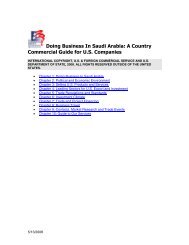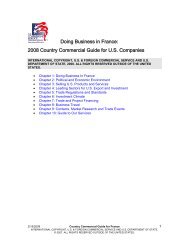Create successful ePaper yourself
Turn your PDF publications into a flip-book with our unique Google optimized e-Paper software.
emanufactured) and certified by a "technical organization" in the country of origin. The<br />
Commercial Section of the Argentine Embassy or an Argentine Consul in the U.S. must<br />
then validate the certification. Used goods may also be refurbished in <strong>Argentina</strong> by the<br />
importer, who is the end user of the goods.<br />
Decree 690/2002 lists used equipment subject to this regime, as well as used equipment<br />
banned from import. Products not mentioned in the decree (as either permitted or<br />
prohibited) are considered as new for tariff purposes.<br />
Specific rules apply to imports of used production lines (Resolution ME 511/2000 and<br />
modifications). The special regime for imports of used production lines was implemented<br />
in 2000, and comprises those “items whose main component is used imported<br />
machinery, as part of an investment project for industrial production.” The regime aims to<br />
facilitate access to goods not manufactured in <strong>Argentina</strong>, whose price is not affordable to<br />
local SMEs currently suffering the lack of accessible credit lines. The regime is currently<br />
in force until December 31, 2008. An import duty of 6 percent applies for the used<br />
production lines imported. Additionally, these imported goods do not pay Verification of<br />
Destination Fee.<br />
For additional information, please contact the U.S. Commercial Service in Buenos Aires<br />
at Buenos.Aires.Office.Box@mail.doc.gov.<br />
Customs Regulations and Contact <strong>In</strong>formation Return to top<br />
At a national level, the General Customs Bureau (Dirección General de Aduanas, DGA)<br />
applies, collects and controls taxes under the Argentine Customs Code. Additionally, it<br />
regulates other taxes on import and export transactions on behalf of other entities. <strong>In</strong><br />
general, the DGA applies and controls import and export transactions.<br />
The DGA depends on the Federal Public Revenue Administration (Administracion<br />
Federal de <strong>In</strong>gresos Públicos, AFIP). AFIP is an autonomous authority in the<br />
administrative level, under the general supervision and legal control of the Ministry of<br />
Economy. It executes the tax and customs policies set by the Executive Branch.<br />
For Customs-related information or questions, contact:<br />
3/4/2008<br />
Administracion Federal de <strong>In</strong>gresos Públicos, AFIP<br />
Phone: 0810-999-2347 (0810-www-AFIP) (Spanish)<br />
Mo-Fr 8am-7pm<br />
Contact <strong>In</strong>formation<br />
FEDERAL PUBLIC REVENUE ADMINISTRATION<br />
(Administracion Federal de <strong>In</strong>gresos Públicos, AFIP)<br />
Mr. Alberto Abad<br />
Federal Administrator<br />
Hipólito Yrigoyen 370 (C1086AAD)<br />
Phone: (54) (11) 4347-2000












